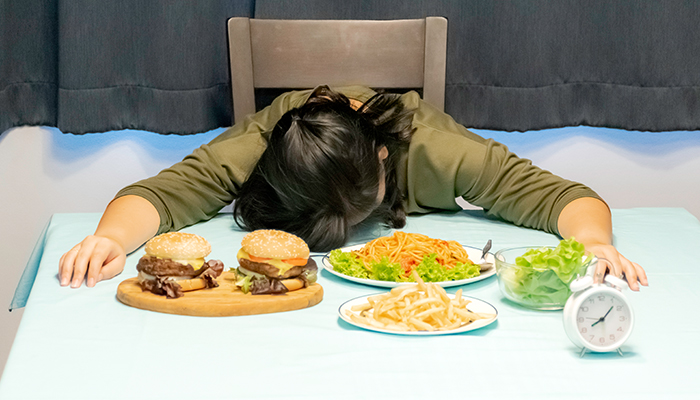Sleep does much more than help us feel refreshed. It’s deeply connected to our metabolism, appetite, and weight. Many people overlook the connection between sleep and weight loss, but science shows they are deeply connected.
In this blog, we’ll explore how your sleep habits affect your waistline and what you can do to sleep better and lose weight more effectively.
Why Sleep Matters for Your Weight
Sleep is essential for your body to function properly. It allows your brain to reset, your muscles to recover, and your hormones to rebalance. Poor sleep disrupts many of these functions. This leads to a higher risk of weight gain and other health issues. Understanding the link between sleep and weight loss can help you take a more complete approach to managing your health.
Sleep and Metabolism: What’s The Connection?
Your metabolism is the process by which your body converts food into energy. When you sleep well, your body burns calories more efficiently. But if you don’t get enough rest, your metabolism slows down. This makes it harder for your body to burn calories and fat. Simply put, poor sleep leads to poor calorie burning.
Studies have found that people who don’t get enough sleep experience changes in their resting metabolic rate. This means they burn fewer calories even when doing nothing. So, if you’re trying to lose weight, getting enough rest is just as important as eating well and exercising.
Sleep Deprivation and Weight Gain

Lack of sleep can lead to significant weight-related issues. Sleep deprivation and weight gain often go hand in hand. When you don’t sleep enough, your body produces more of the stress hormone cortisol. This hormone can increase fat storage, especially around your belly.
At the same time, poor sleep affects how your body responds to insulin. This link between sleep and insulin resistance means your body has a harder time processing sugar. Over time, this can lead to more fat storage and even obesity.
Sleep and Appetite Hormones: Why You Feel Hungrier
Have you ever noticed how you feel hungrier after a bad night’s sleep? That’s not your imagination. There’s a strong connection between sleep and appetite hormones like ghrelin and leptin.
Ghrelin is the hormone that makes you feel hungry. Leptin is the one that signals you’re full. When you don’t get enough sleep, your ghrelin levels go up, and your leptin levels go down. So, you end up eating more than usual, especially unhealthy snacks. This connection between sleep and ghrelin and sleep and leptin helps explain why sleep is so important for appetite control.
Sleep and Cravings: Why Junk Food Becomes Irresistible
When you’re tired, your brain’s reward system kicks into overdrive. You start craving high-sugar and high-fat foods. This is because poor sleep affects how your brain processes food rewards. Research has shown that sleep-deprived people are more likely to crave junk food late at night.
This not only increases your calorie intake but also leads to fat storage. In short, if you want to control your cravings, you need to prioritise good sleep,
Sleep and Energy Balance: The Fatigue Factor

Energy balance is the difference between calories in and calories out. If you’re too tired to move around to exercise, you’re more likely to gain weight. This is why the connection between sleep and energy balance is in any weight loss plan.
People who don’t sleep well tend to feel too tired for physical activity. This reduces their calorie burning and disrupts the whole weight loss process. Better sleep can boost your energy and help you stay active throughout the day.
Sleep and Fat Loss: More Than Just a Dream
If you think losing fat is only about cutting calories and going to the gym, think again. Sleep and fat loss are closely related. During deep sleep, your body works on fat metabolism and muscle repair. This is when fat burning happens most effectively.
When you’re sleep-deprived, your body holds on to fat instead of burning it. You might lose weight, but it may come from muscle instead of fat. So, if you want to shed fat and keep your muscles, quality sleep is a must.
Sleep and Calorie Intake: The Mindless Eating Trap
Sleep-deprived people tend to eat more. Not because they’re hungrier, but because their ability to make healthy choices weakens. Poor sleep affects the part of your brain responsible for decision-making. As a result, you’re more likely to snack late at night or eat out of boredom.
This explains the link between sleep and calorie intake. With better sleep, you’re more in control of your hunger signals and less likely to eat mindlessly.
Sleep and Obesity: A Growing Concern
Poor sleep doesn’t just affect individuals — it’s becoming a public health concern. Many studies have shown that short sleep duration is linked to higher rates of obesity. This is due to a mix of hormonal changes, increased appetite, lower energy levels, and insulin resistance.
When we talk about sleep and obesity, it’s important to look at both the quantity and quality of sleep. A regular sleep schedule, along with deep and restful sleep, plays a big role in maintaining a healthy weight.
Sleep and Hunger Hormones: A Delicate Balance

To stay at a healthy weight, your hunger hormones need to stay balanced. As we mentioned, ghrelin makes you hungry, while leptin helps you feel full. But sleep also affects other hormones like insulin and cortisol.
When you don’t get enough rest, insulin resistance can increase. This not only affects blood sugar levels but also encourages fat storage. Cortisol, the stress hormone, rises too, and high cortisol is linked to belly fat. The connection between sleep and cortisol can’t be ignored if you're working on weight management.
Sleep and Appetite Regulation: Keeping Things in Check
Good sleep helps regulate your appetite by keeping hormones in balance and brain signals clear. When you're well-rested, you can trust your body’s hunger and fullness cues. But when you're not, these signals become unreliable.
So, instead of trusting your gut, you might eat just because you feel hungry. This makes it harder to stick to healthy eating habits. If you want to improve appetite regulation, focus on improving your sleep.
Sleep and Fat Storage: The Silent Problem
Another major issue with poor sleep is increased fat storage. Even if you eat healthy and exercise, a lack of sleep can cause your body to store more fat. This is especially true in the belly area, which is linked to higher health risks.
This process happens because of a mix of hormonal imbalances, poor insulin response, and low energy use. So, don’t ignore the connection between sleep and fat storage — it could be stopping your progress.
Sleep and Calorie Burning: Burn While You Rest
Yes, your body burns calories even when you sleep. Deep sleep is the time when your body does most of its repair and maintenance. If you cut your sleep short, you also reduce the time your body has to burn calories in this restful state.
Improving your sleep can actually help with calorie burning. It might not replace exercise, but it certainly supports your efforts.
Sleep and Fat Metabolism: Let Your Body Work for You
Fat metabolism is the way your body breaks down fat to use as energy. Sleep plays a key role in this process. When you're asleep, your body shifts into repair mode and uses fat for fuel.
When you don't get enough sleep, fat metabolism slows down. Your body holds onto fat instead of breaking it down. This is one of the many reasons why sleep and fat metabolism are so important in any weight loss journey.
Simple Tips to Improve Your Sleep for Better Weight Management

- Stick to a schedule: Go to bed and wake up at the same time every day.
- Limit screen time: Avoid phones and screens at least an hour before bed.
- Create a relaxing routine: Try reading, meditation, or gentle stretching before sleep.
- Avoid heavy meals late at night: Your body needs time to digest.
- Keep your room dark and cool: This helps promote deeper, more restful sleep.
Better sleep means better control over your hunger, hormones, and habits — all of which are essential for successful weight loss.
Final Thoughts
Sleep is not just a luxury; it’s a vital part of your weight loss journey. The link between sleep and weight loss is backed by science, and ignoring it could slow your progress. By improving your sleep quality, you can better manage your hunger, control your cravings, boost fat metabolism, and burn calories more efficiently. So, if you're serious about weight management, make sleep a priority.

Can sleeping more help me lose weight?
Yes, getting enough sleep supports healthy metabolism, reduces cravings, and improves hormone balance. It won’t cause weight loss on its own, but it supports your efforts.
How many hours of sleep do I need to lose weight?
Most adults need 7–9 hours of sleep per night. Consistency is key.
Why do I crave junk food when I’m tired?
Lack of sleep increases ghrelin and decreases leptin, making you hungrier and more likely to crave high-sugar and high-fat foods.
Is it possible to gain weight from poor sleep even if I eat the same amount?
Yes. Poor sleep affects insulin and cortisol levels, slows metabolism, and can lead to fat storage, even if your diet doesn’t change.


